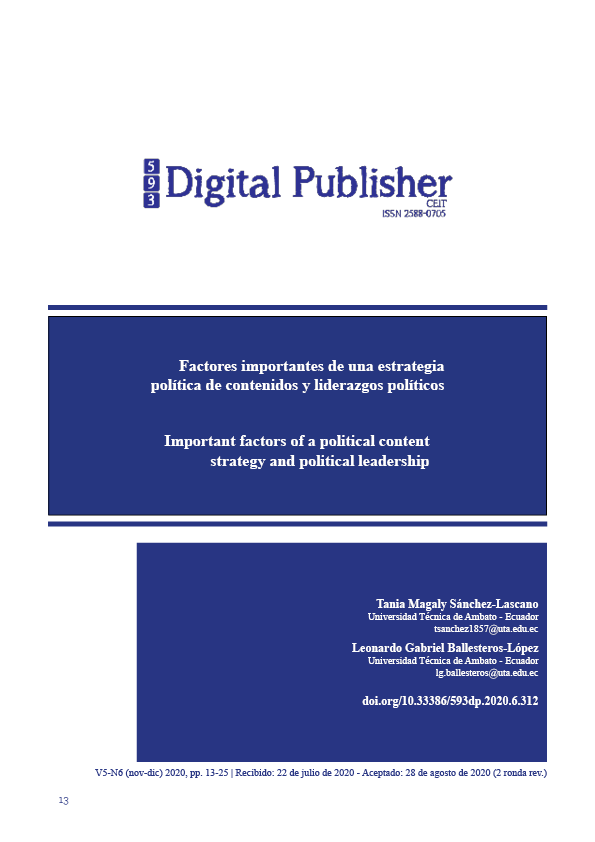Digital marketing factors that strengthen business culture located in Tungurahua province
Main Article Content
Abstract
This article aims to analyze the Digital Marketing Factors that strengthen the business culture located in the province of Tungurahua. It is important that the business culture be focused on the implementation of digital media in order to increase their participation in this current market. In this way applications of new technological trends will allow for the innovation the traditional way of advertising as well as promote an eagerness to use digital marketing as an indispensable tool. The research is aimed at entrepreneurs in order to identify the importance of carrying out their online sales, as well as their degree of positive interaction with their future customers. This study focused on a bibliographic and documentary methodology that allows for the description of the most relevant data on the object of study. Furthermore, with the application of a questionnaire that will allow for the obtaining of the primary data, which once collected was processed and then interpreted using the supporting tools for the results. With this information it was determined that marketing techniques are needed in digital media in order to optimize the resources of the organization and the way in which the target audience is reached such as through social networks, blogs and websites. These actions lead to positive changes in a certain period of time by successfully reaching customers as well as influencing the organization to meet its goals set in this demanding market. Thus, providing the key to success by the way of a positive experience. Finally, It is recommend that organizations invest in digital marketing. It is essential that an active profile is obtained in the channels most used by their target audience so as to create the opportunity for the quality content produced to go viral and to have a more direct and humanized communication between the company and their loyal customers. It is not worth leaving the customer waiting for a response for a long time since there are ways correct this issue efficiently.
Downloads
Article Details

This work is licensed under a Creative Commons Attribution-NonCommercial-ShareAlike 4.0 International License.
1. Derechos de autor
Las obras que se publican en 593 Digital Publisher CEIT están sujetas a los siguientes términos:
1.1. 593 Digital Publisher CEIT, conserva los derechos patrimoniales (copyright) de las obras publicadas, favorece y permite la reutilización de las mismas bajo la licencia Licencia Creative Commons 4.0 de Reconocimiento-NoComercial-CompartirIgual 4.0, por lo cual se pueden copiar, usar, difundir, transmitir y exponer públicamente, siempre que:
1.1.a. Se cite la autoría y fuente original de su publicación (revista, editorial, URL).
1.1.b. No se usen para fines comerciales u onerosos.
1.1.c. Se mencione la existencia y especificaciones de esta licencia de uso.
References
Aguilar, J. L. ((2010)). La cultura empresarial en la gestión de las empresas familiares: Una aproximación teórica. Investigación y Ciencia, (Vol. vol. 18).
AL, I. ((2010).). Marketing digital.
Arias, M. A. ((2013).). Marketing digital. Posicionamiento SEO, SEM y Redes sociales. IT Campus Academy.
Brunetta, H. ((2013)). Marketing digital ebook: Claves para implementar estrategias efectivas en redes sociales. RedUsers.
Buenaño, D. E. ((2015)). Usuarios, clientes y consumidores digitales: consideraciones para su abordaje desde el marketing y la comunicación corporativa. Redmarka: revista académica de marketing aplicado,(no 14,), p. 3-19.
Constantine Espinoza , S. E., & Ubilla Basantes , J. X. (Septiembre de (2018)). Plan de Marketing Digital para la agencia de publicidad La Fresh Agency. Guayaquil, Guayas, Ecuador. Obtenido de http://192.188.52.94/bitstream/3317/11122/1/T-UCSG-PRE-ESP-CIM-429.pdf
Contreras Soto, R., López Salazar , A., & Ríos Manríquez, M. ((2011)). Cultura Empresarial: análisis social de los valores en la Mipyme. Guanajuato.
De Salas Nestares, M. I. ((2010)). La publicidad en las redes sociales: de lo invasivo a lo consentido. Icono14.
de Vicuña Ancín, J. M. ((2018)). El plan de marketing digital en la práctica. Esic editorial.
Delfín Pozos, F. L. ((2016)). Importancia y análisis del desarrollo empresarial. Revista científica Pensamiento y gestión,, no 40.
DIEE. (2014). Metodología Directorio de Empresas y Establecimientos. Obtenido de https://revistas.uta.edu.ec/erevista/index.php/bcoyu/article/view/599/421
Domínguez, D. C. ((2010).). Las Redes Sociales. Tipología, uso y consumo de las redes 2.0 en la sociedad digital actual. Documentación de las Ciencias de la Información, vol. 33, p. 45-68.
Fonseca, A. ((2014)). Marketing Digital en Redes Sociales: Lo imprescindible en Marketing Online para tue empresa en las Redes Sociales.
Formoso, J. F. ((2011).). La integración de los sistemas de gestión. necesidad de una nueva cultura empresarial. Dyna,, vol. 78(no 167), p. 44-49.
Fraguela Formoso, J. A., Carral Couce, L., Castro Ponte, A., & Rodríguez Guerreiro, M. J. (26 de Abril de (2011)). La integración de los sistemas de gestión. necesidad de una nueva cultura empresarial. Redalyc, vol. 78(núm. 167), pp. 44-49. Obtenido de https://www.redalyc.org/articulo.oa?id=49622358005
García Villaverde, P. M., & Valencia de Lara, P. (Julio de (2009)). FACTORES DE ÉXITO DEL PROCESO DE PUESTA EN MARCHA DE LA. Investigaciones Europeas de Dirección y Economía de la Empresa, vol. 15(Nº 3), pp. 101-117. Obtenido de https://pdf.sciencedirectassets.com/282628/1-s2.0-S1135252312X60118/1-s2.0-S1135252312601038/main.pdf?X-Amz-Security-Token=IQoJb3JpZ2luX2VjEJn%2F%2F%2F%2F%2F%2F%2F%2F%2F%2FwEaCXVzLWVhc3QtMSJIMEYCIQCKdKX6jPsI9UXcgOU%2FQ86Ksf%2F4KGyZtrVdVRRyXE8CxgIhANQkGWgm
Guerrero, E. F. ((2011).). Influencia de la Cultura Organizacional en la Competitividad de las Empresas. Escenarios, vol. 9, p. 18-23.
Huari Maximiliano, P. J. ((2019)). Propuesta de mejora del marketing digital como factor relevante para la gestión de calidad en las micro y pequeñas empresas del sector servicio, rubro restaurantes del distrito de san Vicente, provincia de Cañete, 2018. FACULTAD DE CIENCIAS CONTABLES, pp.35. Lima, Perú. Obtenido de http://repositorio.uladech.edu.pe/xmlui/bitstream/handle/123456789/15388/MICRO_EMPRESAS_GESTION_CALIDAD_PATRICIA_JUSTINA_HUARI_MAXIMILIANO%20.pdf?sequence=1&isAllowed=y
INEC. (s.f.). Directorio de Empresas y Establecimientos Tungurahua 2014.
Kutchera, J. G. ((2014)). EXITO: su estrategia de marketing digital en 5 pasos. Grupo Editorial Patria.
Landa, M. I. ((2016).). Fitness-management: el conflictivo devenir de una cultura empresarial. Revista Brasileira de Ciências do Esporte, vol. 38, p. 18-25.
Liberos, E. ((2013)). El libro del marketing interactivo y la publicidad digital. Madrid, España: ESIC Editorial. Obtenido de https://books.google.es/books?hl=es&lr=&id=vKUefpQYvZkC&oi=fnd&pg=PA91&dq=factor+MARKETING+DIGITAL+interactividad&ots=73AFkXbIqn&sig=XpXUB38o8dCzEJpikZfbWRpYee0#v=onepage&q=factor%20MARKETING%20DIGITAL%20interactividad&f=false
López, A. (Agosto de (2010)). LA PROACTIVIDAD EMPRESARIAL COMO ELEMENTO DE COMPETITIVIDAD. Revista de Sociedad, Cultura y Desarrollo, vol. 6(núm 2), pp. 303-312. Obtenido de http://uaim.edu.mx/webraximhai/Ej-17articulosPDF/11%20La%20Proactividad%20empresarial%20como%20elemento%20de%20Competitividad%20_Alejandra%20Lopez.pdf
López, P. L. ((2004)). POBLACIÓN MUESTRA Y MUESTREO. Punto Cero, v.09 (n.08). Obtenido de http://www.scielo.org.bo/scielo.php?script=sci_arttext&pid=S1815-02762004000100012
Maqueira, J. M. ((2009)). Marketing 2.0: el nuevo marketing en la web de las redes sociales.
Morán Quiñonez, C. J., & Cañarte Rodríguez, T. C. (Septiembre de (2017)). Redes sociales factor predominante en la fidelización del cliente. Dominio de las Ciencias, vol. 3(núm. 4). Obtenido de file:///C:/Users/GATO9/Downloads/Dialnet-RedesSocialesFactorPredominanteEnLaFidelizacionDel-6234736.pdf
Moschini, S. (Abril de (2012)). Claves del marketing digital. La nueva comunicación empresarial en el mundo 3.0. Obtenido de http://hispamedia.net/desarrollo/socialmedia/Manual_Marketing_Gratis/01%20-%20Cursos%20y%20manuales%20de%20Claves-del-Marketing-Digital.pdf
Núñez, M. T. ((1994)). Cultura empresarial y estrategia de la empresa en España: su realidad actual y su diseño del cambio. Ediciones Rialp.
Ocampo Villegas, M. C. ((2011)). Comunicación Empresarial; plan estratégico como herramienta gerencial y nuevos retos del comunicador en las organizaciones (Segunda edición ed.). (M. H. González M, Ed.) Bogotá, Colombia: Ecoe. Obtenido de https://intellectum.unisabana.edu.co/bitstream/handle/10818/26779/taco%20comunicacion%20empresarial%202%20ed_imprenta.pdf?sequence=1
Perez, D. B. ((2018)). Marketing digital.
Poma, R. M. ((2018)). Marketing Digital, una Visión desde la Academia. Revista Órbita Pedagógica. ISSN 2409-0131, vol. 5, p. 28-37.
Puelles Romaní, J. R. ((2014)). Fidelización de marca a través de redes sociales: Caso del Fan-page de Inca Kola y el público adolescente y joven.
Rodríguez-Penelas, H. ((2008)). La cultura es también una Responsabilidad Social Empresarial. . Revista Empresa y Humanismo, p. 109-134.
Romo, M. A. ((2004)). La cultura empresarial en México. México.: Uaa.
Saavedra, F. U. ((2013)). El uso de las redes sociales digitales como herramienta de marketing en el desempeño empresarial. Cuadernos de administración, vol. 26(no 47), p. 205-232.
Salcedo, I., & Romero, J. J. ((2006)). Cultura Organizacional y Gestión de la Calidad en una Empresa del Estado venezolano. Revista Venezolana de Gerencia, vol. 11(núm. 33), pp. 83-104. Obtenido de https://www.redalyc.org/pdf/290/29003306.pdf
Selman, H. ((2017)). Marketing digital. Ibukku.
Sixto García, J. (. ((2015)). Desarrollo de las redes sociales como herramienta de marketing. Estado de la cuestión hasta 2015. Revista Anagramas, vol. 14(no 26.).
Thevenet, M. ((1992)). Auditoría de la cultura empresarial. Ediciones Díaz de Santos.
Torres Carmona, M. A. ((2017)). Instagram y su uso como una herramienta de marketing digital en Chile.
Vallina, M. M. ((2014)). Marketing digital: Comercio y marketing. Ediciones Paraninfo, SA.
Varela, R. ((2011)). La cultura empresarial como estrategia de desarrollo para América Latina. . Creación de empresas–Entrepreneurship.
Villalba Leiva, R. F. ((2015)). Plan Estratégico de Marketing Digital con uso de redes sociales enfocado a empresas líderes del sector financiero de la ciudad de Quito, especializadas en el segmento de consumo con tarjetas de crédito MasterCard y Visa.
Vinces, A. ((2018)). Cultura empresarial en estudiantes universitarios.



